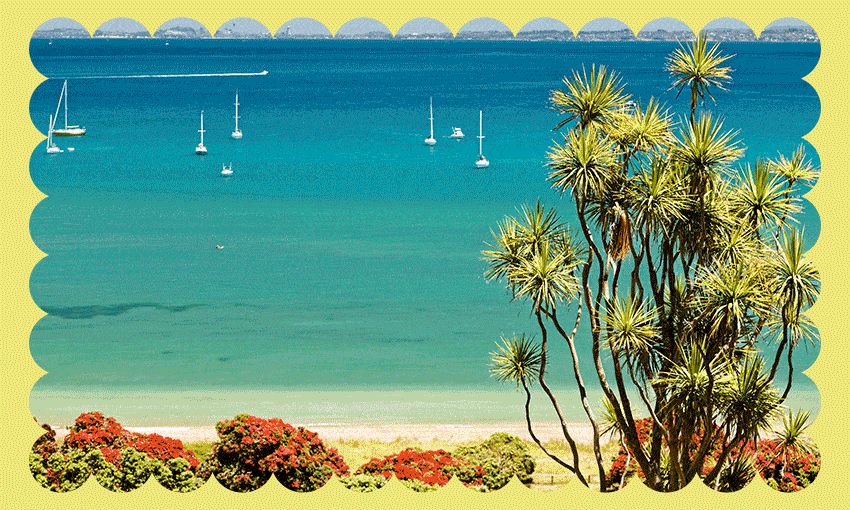Want to avoid being a bad visitor at the beach this summer? Just follow these simple steps.
My partner’s whānau has had a bach in Whangaparāoa, 45 minutes north of Auckland, since the 1950s. They’ve been around long enough to become a part of the bay’s furniture. They know the neighbours next door, up and down the road, behind them and the next bay over. And now, so do I.
Our little slice of paradise gets much busier during summer as visitors descend to get their beach fix. Most visitors are courteous, respecting both the official and unofficial summer rules. But occasionally, a group of visitors come along who piss off the locals. Not only are the actions of these people rude and inconsiderate, but they can also be dangerous for both locals and other guests.
Luckily, there are some simple ways to not piss off the locals this summer.
Take your rubbish home
Most beach bins are not well equipped to handle the influx of visitors during summer. These bins are great for collecting locals’ dog shit and miscellaneous rubbish brought in by the sea but struggle to contain summer visitors’ waste like takeaway boxes, cans and bottles. During summertime, many beach bins overflow. Locals are forced to clean up after guests, and what we miss often ends up in the sea. There is already enough trash in the ocean without beachgoers’ vape pods and pizza boxes ending up there too.
Just as you wouldn’t (I hope) leave your rubbish in someone’s home, don’t leave it on the beach.
Don’t go through private property
This one is self-explanatory. Not only is it rude, but it’s also illegal. Your search for a shortcut to the beach shouldn’t impede on someone’s property rights.
Don’t go faster than five knots within the 200m buoys
Many beaches have buoys 200m from the shoreline to indicate where boats, jet skis and other marine vehicles need to limit their speed to five knots, or roughly 9km per hour. This summer, we witnessed two jet skis racing to the pontoon within the 200m buoys much faster than five knots. Once they arrived at the pontoon, both jet skis did doughnuts around it.
Call us entitled Karens or nimbys, but we reported the jet skis to the Coastguard, and in the meantime, we went over to nicely ask them to follow the rules. After our chat, while we were on the beach, they were more receptive to the rules, but they returned to their reckless behaviour once we left.
Within the 200m buoys is where most people swim – kids, the elderly and everyone in between. Pontoons in particular are used by many parents to build their kids’ water confidence. No one wants to be knocked out by a careless jet ski while enjoying the water, so the five-knot speed limit is an important safety measure. There were 91 drownings in New Zealand last year, the highest since 2011. Reckless speeds within the 200m buoys are an extra risk to swimmers that only increases the chance for another record year in 2023.
Respect the summer dog restrictions
Plenty of beaches restrict dog access during summer because of how busy they get. For example, during summer, our four-legged best friends are only allowed on many Auckland beaches between 5pm and 10am. These rules are in place to protect both dogs and people, so respect them.
Turn your speaker down
The beach is a place to connect with nature in all its glory, including its sounds. Not many people at the beach want the meditative sound of waves crashing drowned out by music that’s loud enough for a rave. My partner’s grandma has proclaimed, “keep the boom boxes down” at the beach.
Carpool
Most beaches have limited parking that gets filled up quickly during summer. If fewer than six of you are going to the beach, you don’t need to take more than one car. For the sake of other visitors trying to find a park and traffic flow on narrow roads, just carpool. Excessive parked cars are such a bad problem at Auckland’s Point Chevalier beach in summer that buses have been blocked from completing their route for several years.
Smile and say hi
A big difference I notice when I’m at the beach compared to in the CBD is how much people smile and greet each other. At the beach, everyone is happy to stop and chat, but in town, a lot of people seem to be in a grumpy rush. Next time you’re at the beach, smile and say hi to the people next to you or chat with the locals. You never know, you might learn about some secret scenic spots or the best local kai.
With these tips in mind, you’ll be well on your way to being a good guest at the beach this summer. If there is anything you are unsure about, ask a local. They’re always happy to help others enjoy their little slice of paradise as long as the guests are willing to respect the official and unofficial summer rules.

